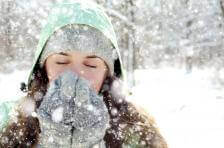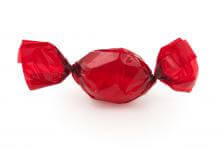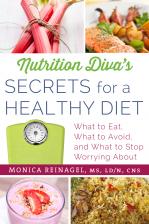Can Zinc Really Shorten a Cold?
There’s nothing worse than waking up with that little tickle in your throat that signals an impending cold. Can zinc lozenges or sprays help fend off a virus? Nutrition Diva investigates.

Of course, it might be nothing. We just turned the heat on for the season; maybe I was just feeling the drier air. I’d spent a lot of time raking leaves the day before; maybe it was a mild allergic reaction to all the leaf dust in the air.
Or…duh duh duh…it could be the first signs of an impending cold. And with a series of holiday concerts coming up this month, I absolutely could not afford to succumb. So, I went into emergency mode…a mode that every singer out there will recognize. I got out the neti pot and the facial steamer, made chicken soup, ginger tea, and started gargling with salt water.
I also went to the drug store to pick up some vitamin C and echinacea. Yes, I know the evidence that these supplements prevent colds is pretty weak. But I was feeling desperate. In other words, this evidence-based nutritionist was more than willing to invest $15 in a good old-fashioned placebo response.
See also: Catch Fewer Colds This Year
Sponsor: Thanks to Audible for supporting our channel. Get a free audiobook of your choice at audiblepodcast.com/diva.
While I was at the drug store, I also bought some zinc lozenges which claimed to be clinically proven to reduce the duration and severity of a cold, especially when taken at the first sign of symptoms (make that $20 for a good old-fashioned placebo response).
Long Live the Placebo Response!
I’m happy to say that I did not get sick. And of course I’ll never know whether my all my emergency interventions made any difference or whether it really was just a false alarm. Frankly, I don’t care. If faced with the same set of circumstances, I’d probably do it all again.
Long live the placebo response!
But it did make me curious about these zinc products and how they might work.
How Does Zinc Work to Shorten Colds?

Zinc lozenges are thought to work by releasing electrically charged ionic zinc, which has an affinity for that same receptor. The idea is that the zinc occupies enough of these receptors to make your nasal-pharyngeal cavity unhospitable to viruses that may be roaming around looking for a new home. The zinc you get from your diet or supplements doesn’t have the same effect.
See also: 5 Tips to Treat the Common Cold
A review of the scientific literature indicates that zinc lozenges can indeed shorten the duration of the common cold by up to 42%. Even better, zinc lozenges can also lessen the severity of your symptoms. Either way, sign me up.
What About Zinc Sprays?

All of the nasal products that once contained zinc have now been reformulated so that they don’t contain any zinc. This removes the concern but it probably also renders them useless. If you have a bottle of zinc nasal spray that’s been lurking around in the medicine cabinet for a few years, throw it away.
How to Beat a Cold with Zinc Lozenges
Zinc lozenges made with zinc acetate or zinc gluconate will release the most ionic zinc and the best effects are seen at dosages of at least 75 mg a day. For the popular Cold-Eeze brand, that means about 6 lozenges a day, or one every 2-3 hours while you’re awake. Don’t chew the lozenges; allow them to dissolve slowly in your mouth.
You also need to act quickly in order to get the best results – within 24 hours of your first symptoms. It may also be worth taking zinc lozenges for a few days if you know you have been exposed to someone with a cold, as this may reduce your chances of catching it.
See also: Common Cold Myths – Busted!
Of course, at this time of year, it seems like everyone has a cold, so it might seem reasonable to suck on zinc lozenges until spring comes. However, it’s not a good idea to use zinc lozenges for more than 7 days at a time, so you want to save them for when you really need them.

Check out more ways to stay healthy and well in my book, Nutrition Diva’s Secrets for a Healthy Diet. It makes for an awesome stocking stuffer.
References
Eby GA 3rd. Zinc lozenges as cure for the common cold–a review and hypothesis. Med Hypotheses. 2010 Mar;74(3):482-92.
Hemilä H. Zinc lozenges may shorten the duration of colds: a systematic review. Open Respir Med J. 2011;5:51-8.
Hulisz D. Efficacy of zinc against common cold viruses: an overview. J Am Pharm Assoc (2003). 2004 Sep-Oct;44(5):594-603.






